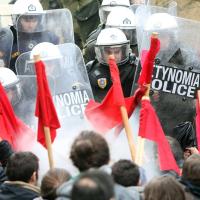
General strike on 7 February opposes “mediaeval labour conditions!"
At the present time, foreign creditors and the Troika (IMF, ECB and EU) are trying to impose a new round of severe cuts on Greece, including 20% wage cuts in the private sector and an immediate slaughter of 15,000 public sector job as part of the destruction of 150,000 jobs by 2015. At the same time, support for the parties supporting the technocrat government of Papademos is in sharp decline. In one recent poll, Pasok, the now neo-liberal former social democratic party, is down to 8%, from 44% in 2009, when it returned to power! The anger and fury about the cuts is now reflected in the hesitancy that ND, the traditional conservative party, and Laos, a right-wing populist force, – in alliance with Pasok behind the Papademos government – are trying to present to the public, before again surrendering to the demands of the markets. “I will not contribute to a revolution out of misery that will then burn the whole of Europe”, Georgios Karatzaferis, the leader of Laos, was quoted, trying to distance himself from the government he supports.
General strike, 7 February 2012
The former banker, Lucas Papademos, was presented in November as a ‘neutral’ technocrat, above the different parties to save Greece after the fall of the Pasok government. On taking over the job of Prime Minister, he had approval rates of 60% or more. Now his support is shattered, and the parties supporting him – Pasok, ND and Laos – have fallen from 83% combined in October 2009 to less than 45% today, with ND on 31% (from 33.4% in 2009) and Laos 5% (5.6%).
The negotiations about a second Greek bailout are hanging in the air, with the potential of triggering a disorderly default. On 20 March, Greece has to repay bonds worth €14.5 billion. After recent austerity measures, unemployment has officially reached 19% and is quickly rising, especially among young people.

General strike on 7 February
The general strike of 7 February showed again the will of the working class to stop all these cuts. It was announced by the trade union confederations ADEDY and GSEE only one day in advance, as it became more than clear that the government was prepared to give in to the decisive demands of the creditors and the European powers. However, this was widely expected, but the trade union leaders did nothing to prepare for this situation and no serious efforts were made to mobilise the workers and youth followed the announcement of another one day general strike.
There is some feeling of despair and frustration following the setbacks after the peaks of the movement in June and October last year with 48 hour general strikes and mass movements trying actively to change the course of events. The retreats led to some confusion. The rage about austerity and the crisis is more reflected in anger of everybody against the whole establishment, but without a clear direction of how to fight back. Therefore, the numbers of demonstrators on the streets in Athens on the general strike on 7 February did not reach the full scale of previous mobilisations. The rain and cold added to the problems. Left-wing activists and trade union militants, for example from the teachers’ union and the combative electricians dominated the demonstration in Greece’s capital.

General strike, 7 February 2012
Still, the ruling class and their politicians can feel that the mood is explosive.
The failure of two years of severe austerity after decades of stagnation and crisis in Greece is now obvious. The capitalist media and TV channels openly discuss the vicious circle of cuts and further economic decline. It’s widely acknowledged now, that this policy of austerity is a blind alley and capitalist commentators now raise the idea of limiting austerity to allow some limited measures promoting growth. The Troika is more and more criticised for imposing their policies and making the situation worse.
Still no significant part of the Greek capitalists wants Greece to leave the Euro-zone, but the debate is in full swing now on what would happen if Greece is kicked out of the Euro or leaves the common currency itself. Parts of the Greek capitalists are trying to use this as a tool to demand more concessions from the Troika.

Polarisation
After the waves of mass mobilisations and strikes in 2011, at the moment the focus is more on party politics and the coming elections. They had been first announced for 19 February, but then were postponed and delayed. ND demands for them to be held on 8 April at the latest, as they hope to win the elections before they are too closely associated with the attacks. However they might have missed their chance already and their rapid decline might be on the way. Nothing is certain on the timing of these elections.
Given the urgent need to find a way out of the crisis, the anger is reflected in growing support for the left parties. The polls indicate, that the Communist Party (KKE) and Syriza together share around 25% or more of the support of all voters. Taking out the non-valid votes and abstentions, this results in a projected 30 to 35% result for both parties together in the coming parliament. In addition, a right-wing split from Syriza, the Left Democrats who are hoping for an alliance or even coalition with Pasok, are on an estimated 18%.
At the same time, the Greek neo-fascists, the Golden Dawn, are now on 3% and able to enter parliament. Golden Dawn openly praises Hitler, calling him a revolutionary. This would be the first time ever that they get members elected to parliament. This shows the dangers in the present situation, if the left is not able to offer a way out to end the misery of capitalism.

Be the first to comment